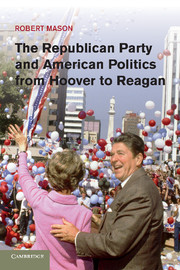Book contents
- Frontmatter
- Contents
- Acknowledgments
- Introduction
- 1 “From Old Home Melodies to Jazz Music”: 1928–1933
- 2 “As Maine Goes, So Goes Vermont”: 1933–1939
- 3 “The Simple Barefoot Wall Street Lawyer”: 1939–1945
- 4 “Liberty versus Socialism”: 1945–1953
- 5 “Modern Republicanism”: 1953–1961
- 6 “A Choice, Not an Echo”: 1960–1968
- 7 “There’s a Realignment Going On”: 1968–1976
- 8 “You Are Witnessing the Great Realignment”: 1977–1989
- Conclusion
- Archival Sources
- Index
Conclusion
Published online by Cambridge University Press: 05 December 2011
- Frontmatter
- Contents
- Acknowledgments
- Introduction
- 1 “From Old Home Melodies to Jazz Music”: 1928–1933
- 2 “As Maine Goes, So Goes Vermont”: 1933–1939
- 3 “The Simple Barefoot Wall Street Lawyer”: 1939–1945
- 4 “Liberty versus Socialism”: 1945–1953
- 5 “Modern Republicanism”: 1953–1961
- 6 “A Choice, Not an Echo”: 1960–1968
- 7 “There’s a Realignment Going On”: 1968–1976
- 8 “You Are Witnessing the Great Realignment”: 1977–1989
- Conclusion
- Archival Sources
- Index
Summary
The history of the Republican Party between the Great Depression and the Reagan years reveals the persistent electoral strength of New Deal liberalism. Time and again voters demonstrated their support for this brand of government activism, which its exponents modified over time in response to changing conditions, but of which moderation was generally a defining characteristic. The Democrats’ moderation usually confounded Republicans’ efforts to promote what they saw as the benefits of conservatism or the shortcomings of New Deal liberalism. For much of the period the majority party displayed skill in holding together its electoral coalition and in preventing the minority from achieving a breakthrough.
More Americans consistently saw themselves as Democratic Party supporters than as Republican Party supporters, as data on party identification suggest. The GOP’s greatest successes depended on defection, not conversion; these were thanks to Nixon Democrats in the late 1960s and early 1970s and Reagan Democrats in the 1980s, as well as Eisenhower Democrats in the 1950s (though contemporaries did not use this last term). Except at times of great crisis – such as the Great Depression – an individual’s party identification was unlikely to change, which made the Republicans’ majority-seeking mission a difficult one. Underpinning Democratic strength was the enduring dominance of concerns relating to New Deal liberalism in electoral politics and in party cleavages, even though the detail of these concerns changed over time; the Democratic Party was the party of New Deal liberalism, and the Republican Party was the party that opposed New Deal liberalism. This government activism did not maintain an equal degree of electoral power throughout the period of the Republican minority; post–Great Society political history is marked by diminished confidence in government to solve socioeconomic problems. But even this decline in New Deal liberalism’s power was not significant enough to enable the Republicans to achieve majority status.
- Type
- Chapter
- Information
- The Republican Party and American Politics from Hoover to Reagan , pp. 282 - 288Publisher: Cambridge University PressPrint publication year: 2011



